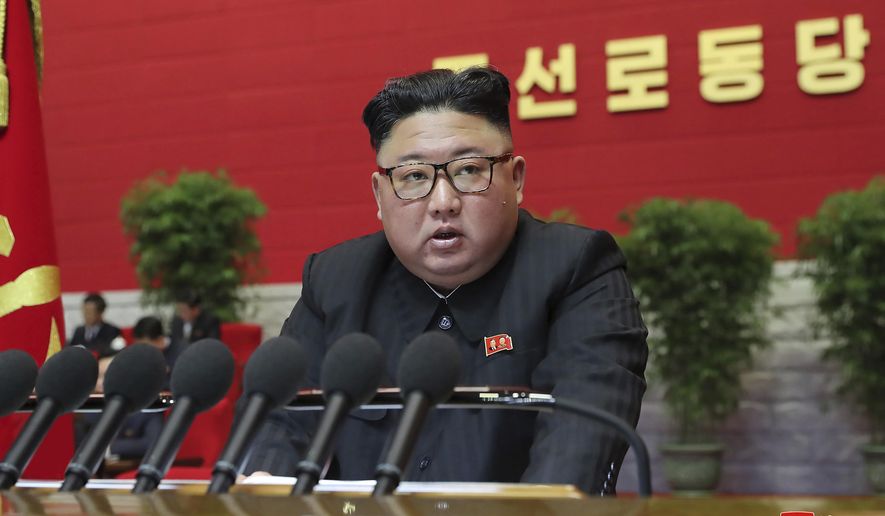North Korean leader Kim Jong-un declared Friday that the U.S. remains his nation’s “biggest enemy” and said he believes Washington will be hostile toward North Korea whether there is a Democrat or Republican in the White House.
Breaking his silence on the outcome of the American presidential election, Mr. Kim also told a vast government rally in Pyongyang that he will continue to advance North Korea’s nuclear weapons capabilities as President-elect Joseph R. Biden comes to office in the United States.
Mr. Kim made the remarks on his 37th birthday during a speech Friday before his regime’s ruling Worker’s Party Congress in the North Korean capital.
According to South Korea’s Yonhap News Agency, North Korean state media said Mr. Kim called for “an unrelenting pursuit of building nuclear power for the safety of our people, the fate of our revolution and the existence and self-reliant development of the country.”
“We need to strengthen the national defense capabilities without a moment of hesitation to deter the United States’ nuclear threats and to bring peace and prosperity on the Korean Peninsula,” a report by the North’s Korean Central News Agency (KCNA) quoted Mr. Kim as saying.
North Korea’s “external political activities going forward should be focused on suppressing and subduing the U.S., the basic obstacle, [and] biggest enemy against our revolutionary development,” Mr. Kim was quoted as saying.
KCNA is the official propaganda outlet of the ruling North Korean regime. The outlet is widely regarded by international observers as a murky window into the activities of the isolated government in Pyongyang. It is known to offer at times conflicting and difficult-to-interpret reports.
The news of Mr. Kim’s remarks about the U.S. came hours after an earlier KCNA report cited the North Korean leader as stressing the need to drastically improve his nation’s ties with the outside world as he addressed a major political conference for the third day.
The Associated Press cited KCNA as saying Mr. Kim also reviewed relations with rival South Korea but didn’t explain what steps he said he wanted to take.
Friday’s developments came on the fourth day of the rare Workers’ Party gathering taking place in Pyongyang this week.
Mr. Kim made no mention of denuclearization, the United States, President Trump or President-elect Joseph R. Biden in remarks to the gathering on Tuesday.
With the North still trying to calibrate its response to the shift of power in Washington, Mr. Kim’s closely watched speech Tuesday focused instead on the country’s troubled domestic economic situation, a sharp departure from his remarks at the last Workers’ Party Congress in 2016. During those remarks, Mr. Kim had spoken at length about nuclear-weapons issues, while also signaling an eagerness for dialogue with the U.S. and South Korea.
A central part of the Trump administration’s strategy over the past four years has been an effort to convince Mr. Kim that the U.S. and other world powers would ease sanctions on Pyongyang if only the Kim regime would fully renounce its nuclear ambitions. But after two summits and a third meeting, Mr. Trump and Mr. Kim failed to reach a major denuclearization deal.
Based on his history and his campaign rhetoric, Mr. Biden is unlikely to pursue the kind of high-stakes direct meetings with North Korea’s leader that were favored by Mr. Trump.
He is instead expected to return to the Obama-era policy of “strategic patience,” isolating Pyongyang through sanctions, and avoid rewarding the Kim regime with diplomatic overtures. Some fear Mr. Kim is likely to test the new administration early, perhaps with a fresh nuclear or long-range ballistic missile test.
• Guy Taylor can be reached at gtaylor@washingtontimes.com.




Please read our comment policy before commenting.